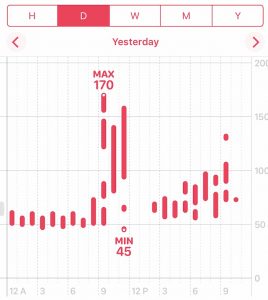
If You Can’t Measure It, You Can’t Improve It.
We believe the famous business quote by Peter Drucker applies to health and fitness as well.
It’s difficult to know where you currently stand healthwise and where you want to be without monitoring and tracking progress. An enjoyable and useful part of the fitness journey is tracking workouts and health stats.
Fitness tracking includes tracking our sleep, workouts, health stats from blood tests, heart rate variability, how foods affect our workouts and more.
Click here to see the latest posts related to fitness tracking
Heart Rate
Monitoring your resting heart rate, HRV (heart rate variability), resting heart rate and your heart rate when you are in different zones of exercise can be a useful way to gauge your general fitness level.
Blood Panels
This includes your lipids and metabolic panels. We want to share with you how diet, exercise, and nutrition affect our cholesterol, triglycerides, blood sugar levels, inflammation markers, and other metrics.
Sleep
Tracking your sleep on a nightly basis makes you realize that sleep is a major part of your recovery. By tracking your sleep you can see how much sleep you need to perform optimally, what affects your sleep, and what you can do to improve the quality of your sleep.
Injuries
If you workout hard and consistently, it’s inevitable that you will have acute and chronic injuries from working out. You also may have pre-existing maladies that affect your workouts and your quality of life.
Keeping an eye on your injuries and auditing what types of mobility exercises, food, supplements or workouts help improve or worsen them is a good way to help prevent future injuries and speed up the healing process of the current ones.
Nutrition, Diet, and Fasting
Yes, there are basic rules that should be followed when it comes to nutrition (too much sugar is bad, don’t constantly overeat etc..) but for the most part, everybody has different nutritional needs.
Foods that are healthy to some people may not be healthy for others. By observing what you put into your system and how it makes you feel, sleep and perform, you can find a good balance between what’s good for you and what you need to feel like you’re living life well i.e. cheat meals!
With so much research coming out about fasting and time-restricted eating, we thought it would be interesting to post about our eating schedules as well as our experiences with fasting.